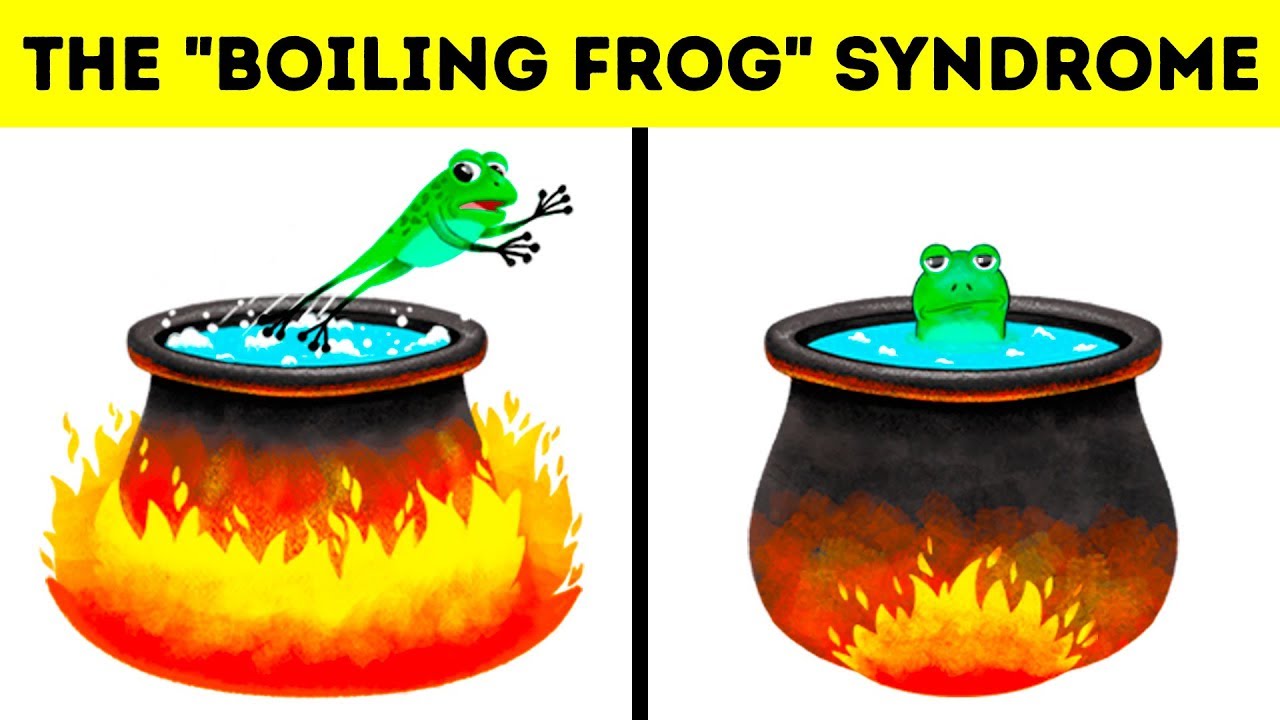15 Psychological Tricks That Rule Your Life
Who is the main choice-maker and action-taker in your life? You? And is there anyone or anything affecting your decisions? No one? Are you sure? When we say our actions are a result of only our own decisions, we lie a bit. In fact, your brain is constantly tricking you, impairing your perception of reality. Bright Side gathered 15 psychological effects that override our behavior and leave us none the wiser.
Do you know, for example, what the boiling syndrome is? It’s named after a real experiment involving a frog in boiling water, hence the name. If you place a frog into a pot with water of a comfortable temperature and start heating it slowly, the frog will exhaust itself trying to stabilize its body temperature and won’t be able to jump out when the water’s boiling. If, however, you place it in boiling water, it’ll jump out right away. It works the same with humans. When we find ourselves in an annoying situation, we prefer to suffer little inconveniences until they drain us to the limit. Difficult relationships and joyless work are both traps we herd ourselves into because we are so reluctant to change things.
TIMESTAMPS:
The “Boiling Frog” Syndrome 1:07
Conservative Thinking 1:52
The Ostrich Effect 2:27
The Blind Spot Effect 3:00
Availability Heuristic 3:49
The Dunning-Kruger Effect 4:15
Zero-Risk Preference 4:40
The Baader-Meinhof Phenomenon 5:07
Audience Effect 5:46
The Halo Effect 6:26
Decoy Theory 7:15
The IKEA Effect 7:36
The “Crab Bucket” Effect 8:04
The Dr. Fox Effect 8:39
Emotional Anticipation 9:06
#psychologicaltricks #psychologicaleffects #boilingsyndrome
Music by Epidemic Sound https://www.epidemicsound.com/
SUMMARY:
– Your brain tends to cling to old beliefs and neglect new and verified data. Here’s a good example: For centuries, people believed Earth was flat. It was just more comfortable to think about it like that!
– You ignore information that upsets you, preferring not to think about the problem. Perhaps you’re glad the teacher hasn’t checked the exam papers yet because you don’t want to know the result.
– This may sound paradoxical, but the inability to see cognitive biases in ourselves is also a bias. The blind spot effect is all about that. People tend to see someone else’s behavioral issues while being blind to their own faults — even the most obvious ones.
– We often overrate the value of available information, especially when making decisions. For instance, a person defending their bad habit would say they know someone who smoked 3 packs of cigarettes a day and lived to be 100.
– When we get the hang of something new, our idea of our talent becomes biased, resulting in inflated self-esteem. That’s why newbies give advice they consider valuable to more experienced colleagues and don’t notice their own mistakes.
– A study by Howard Kunreuther, a professor at the Wharton School, showed that if you give people the choice of either reducing a small risk to zero or dramatically cutting a huge one, the majority choose the former — even if it’s counterproductive.
– Have you ever noticed how you learn a new word or concept and it starts haunting you? In reality, your brain is merely excited since you’ve learned something new, and you start subconsciously looking for it everywhere.
– People perform much better in the presence of their colleagues, clients, or any other audience. However, it only relates to simpler tasks that they’re very familiar with. Performing new and more complicated tasks tends to be harder with a passive audience.
– We usually deem beautiful and talented celebrities to be good people without knowing them personally. Supervisors often judge employees by just one positive or negative characteristic, which affects the big picture.
– The decoy theory is used by smart marketing professionals. When they want you to buy the more expensive of 2 products in the same range, they’ll position a third product that’s overpriced right next to them.
– The more effort you put into something, the more you love and value it.
– People subconsciously don’t want anyone around them to change their life for the better because they themselves will look worse by comparison.
– Most people trust the words of an eloquent speaker, often failing to notice breaches in logic or even false information. At the same time, the words of more competent but less convincing people seem less important
– The more you wait for something, the more excited you feel about it in advance, and the less happy you are when the wait is finally over.
Subscribe to Bright Side : https://goo.gl/rQTJZz
—————————————————————————————-
Our Social Media:
Facebook: https://www.facebook.com/brightside/
Instagram: https://www.instagram.com/brightgram/
5-Minute Crafts Youtube: https://www.goo.gl/8JVmuC
—————————————————————————————-
For more videos and articles visit:
http://www.brightside.me/



![[ID: J2aR2ycNGyU] Youtube Automatic](https://bizimtube.com/wp-content/uploads/2021/03/id-j2ar2ycngyu-youtube-automatic-236x133.jpg)
![[ID: dSyzaiISa_c] Youtube Automatic](https://bizimtube.com/wp-content/uploads/2021/03/id-dsyzaiisac-youtube-automatic-236x133.jpg)
![[ID: UHw65s5njBw] Youtube Automatic](https://bizimtube.com/wp-content/uploads/2021/03/id-uhw65s5njbw-youtube-automatic-236x133.jpg)
![[ID: U8dLGVC6laE] Youtube Automatic](https://bizimtube.com/wp-content/uploads/2021/03/id-u8dlgvc6lae-youtube-automatic-236x133.jpg)
![[ID: Xzf7JlRGWXQ] Youtube Automatic](https://bizimtube.com/wp-content/uploads/2021/03/id-xzf7jlrgwxq-youtube-automatic-236x133.jpg)
![[ID: WjjCsvgODeg] Youtube Automatic](https://bizimtube.com/wp-content/uploads/2021/03/id-wjjcsvgodeg-youtube-automatic-236x133.jpg)
![[ID: ON3eF9gCDr8] Youtube Automatic](https://bizimtube.com/wp-content/uploads/2021/03/id-on3ef9gcdr8-youtube-automatic-236x133.jpg)
![[ID: FADD5_nANBs] Youtube Automatic](https://bizimtube.com/wp-content/uploads/2021/03/id-fadd5nanbs-youtube-automatic-236x133.jpg)
![[ID: 9ZgVg4d2xLA] Youtube Automatic](https://bizimtube.com/wp-content/uploads/2021/03/id-9zgvg4d2xla-youtube-automatic-236x133.jpg)
![[ID: ASGRB47_pxo] Youtube Automatic](https://bizimtube.com/wp-content/uploads/2021/03/id-asgrb47pxo-youtube-automatic-236x133.jpg)
![[ID: ZMPPh3n65iM] Youtube Automatic](https://bizimtube.com/wp-content/uploads/2021/03/id-zmpph3n65im-youtube-automatic-236x133.jpg)
![[ID: NPzlzkqomvo] Youtube Automatic](https://bizimtube.com/wp-content/uploads/2021/03/id-npzlzkqomvo-youtube-automatic-236x133.jpg)